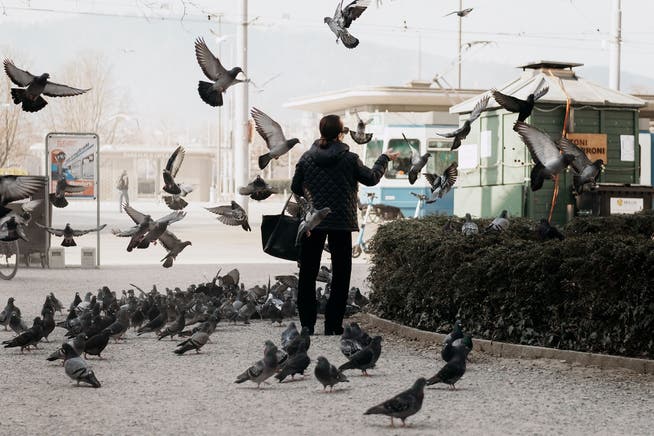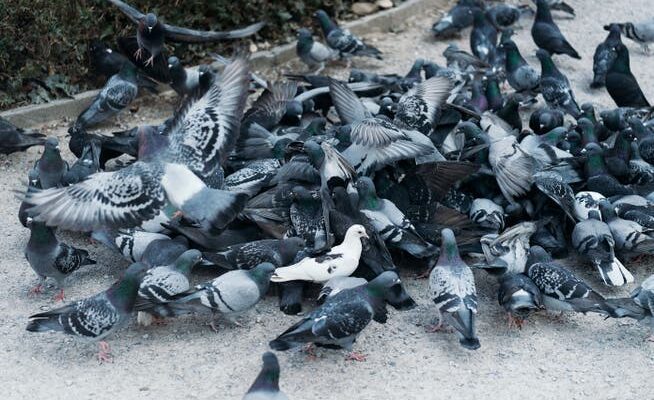When private individuals scatter kilos of bird seed around the city, it becomes a problem. The new hunting law is intended to remedy this.
Pigeons at Stadelhoferplatz in Zurich.
For pigeons and other birds, places like Stadelhoferplatz seem like a huge buffet. On some days, the gala dinner is held several times: when people put out kilos of bird seed on the square, hundreds of pigeons block the way, making it impossible to get through. Anyone who dares to do so must reckon with bird droppings on their coats as a souvenir.
Such scenes should no longer exist – or at least less. Because since the beginning of the year, the new hunting law of the Canton of Zurich has been in force, which prohibits the feeding of wild animals. This also includes foxes, badgers or birds of prey. Anyone who does not comply with the ban must expect a fine of 200 francs.
In addition to Stadelhoferplatz, feeding hotspots in the city of Zurich included Bürkliplatz, Sechseläutenplatz and Stauffacher. “Actually, everywhere where people feed them,” says Marc Werlen, Head of Communications at Grün Stadt Zürich. The city is now drawing attention to the ban with a total of 20 posters.
80 tons of pigeon droppings per year
The city of Zurich once put the pigeon population at 16,000 animals. According to Werlen, however, it is not possible to say exactly how many pigeons actually live in the city. “They don’t stick to community boundaries.” But one thing is clear: the greater the food supply, the more animals there are. “Wild animals should look for their own food, that’s their natural behavior.”
Overfeeding is a problem for the city. Around 80 tons of pigeon droppings accumulate in the city every year. This is not only unhygienic because it can contain viruses, salmonella or bacteria, it also soils facades and other infrastructure. Leftover food also attracts rats and vermin. “But that also applies to leftover pizza that other animals can grab,” says Werlen.
The feeding ban polarized the population. Many people welcome it to keep the “rats of the air”, as pigeons are also called, in check. At the same time, an online petition has been launched in which supervised pigeon lofts are required, as “20 minutes” writes. Pigeons should get species-appropriate food and “medical care” in it. In order to keep the population under control, the laid eggs should be replaced by dummies. This is how it is done in the German city of Augsburg.
This egg theft even became a political issue in the city of Zurich last spring: the majority of the city parliament had submitted a postulate from the SP and the Greens with the demand that the city council have to examine such special pigeon lofts. The then AL city councilor Richard Wolff had unsuccessfully resisted it: Green City Zurich did not have the resources to take the eggs away from thousands of pigeons, said Wolff.
Feeding does not help the endangered bird species
The feeding ban raises a fundamental question: Should birds be fed at all to ensure their survival?
Livio Rey, biologist and media spokesman for the Swiss Ornithological Institute in Sempach, says: “Feeding birds enables beautiful nature experiences. But it doesn’t help the endangered species.” Those birds that come to feeding sites are not endangered. These include blackbirds, blue tits – or just wild pigeons.
In a harsh winter with a closed snow cover, feeding can make life easier for the birds. ‘But it’s not necessary. Those birds that spend the winter in Switzerland are well adapted to local conditions. The others fly to Africa.”

Stadelhoferplatz is a popular place to feed pigeons. Image taken in March 2022.
Most threatened birds live in cultivated land or wetlands, according to Rey. They depend on intact habitats to survive. “Anyone who wants to do something for birds can buy products that are produced in an environmentally friendly way and speak out in favor of nature in elections and votes. And you can equip your own garden with native trees and shrubs and sow flower meadows.” Other wild animals and insects also benefit from this.
Setting up feeders for songbirds is also permitted under the new hunting law, and squirrels and ducks can also be fed – but only in small amounts. “It’s still best if waterfowl have to look for their own food,” says Marc Werlen from Grün Stadt Zürich. ‘But if it’s to be fodder, please no bread, it swells up in the duck’s stomach and the salt is unhealthy. A lettuce leaf is better.”
Important innovations in the hunting law
In addition to the feeding ban for wild animals and birds, the hunting law contains other innovations that affect the population. In order to protect wild animals, dogs must be kept on a leash in the forest and up to 50 meters outside the forest during the breeding and mating season from April 1st to July 31st.
Furthermore, barbed wire fences are no longer permitted in the forest and in the open because wild animals can become entangled in them and die in agony. A transitional period of three years applies.
